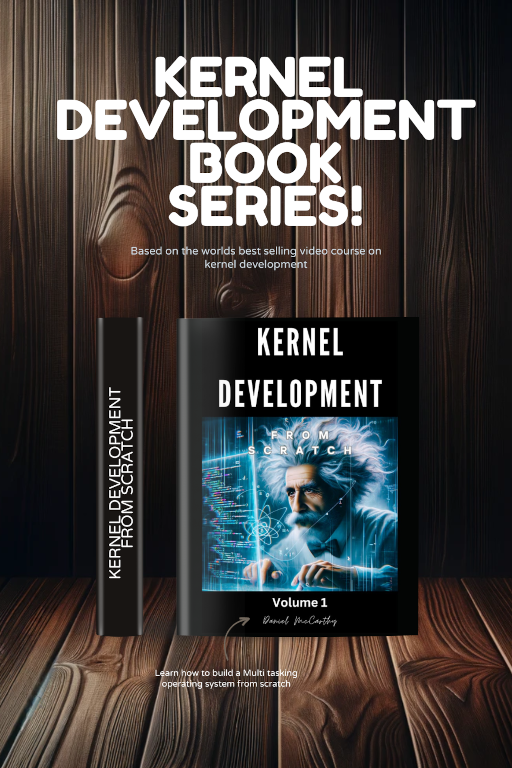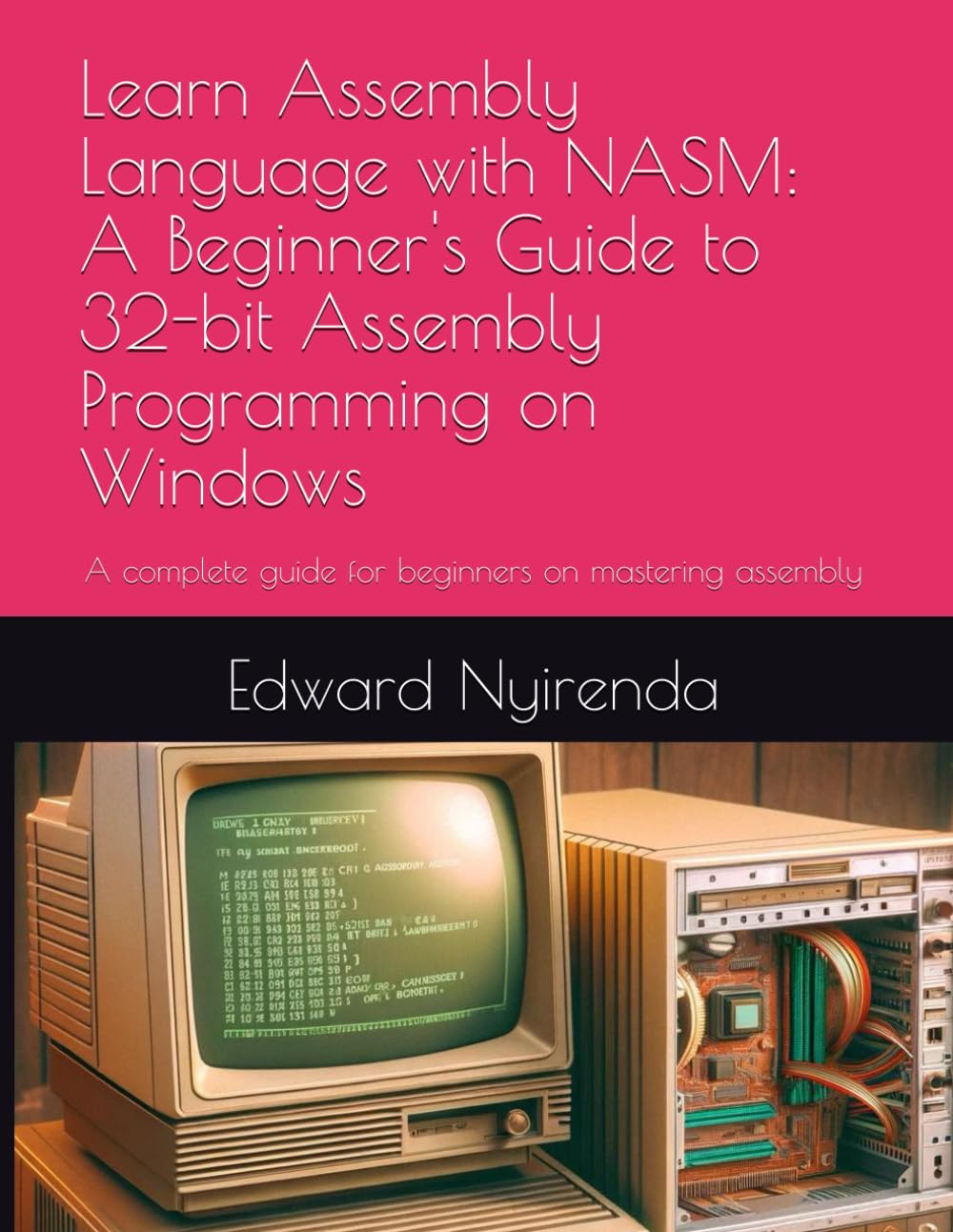Implementing the code generator response system and expressions
No lecture description Lesson locked purchase
Description
Learn to create your very own C compiler from scratch. In this course we develop a compiler that compiles a subset of the C Programming Language. By the time you finish all modules of this course you will be able to compile C programs that use pointers, structures, unions, arrays, functions, for loops, while loops. do while loops, if statements, switches and much more! This course includes all course modules!
Our compiler also has a preprocessor macro system allowing you to include header files and create definitions just like you would in any C file.
Your compiler is advanced enough to use the GCC standard library so we are able to call C functions from our compiler. Your compiler will be able to compile the C programming language.
This course does not rely on any frameworks we do everything from scratch to ensure the best possible learning experience for students
Module 1
In module 1 of this course we load our C source file that we wish to compile, into memory. We create a lexer to preform lexical analysis on the source input which will convert the source code into a bunch of tokens that our compiler can easily understand. We then pass the tokens through a parser to produce an abstract syntax tree. An AST describes the C program in a logical way that makes it easier for our compiler to understand. For example for the expression 50 + 20 you will end up with a root expression node that has a left operand that has a node of value 50 and a right operand that has a node of value 20. Breaking down problems in this way makes it much easier to create compilers.
Module 2 & 3
In module 2 and 3 of this course we create a code generator that produces 32 bit Intel assembly language that can then be passed through an assembler to produce a program binary that we can run. We also in this module create a resolver system which is responsible for taking a complicated expression such as "a->b.c.e[50] = 50" and breaking it down into simple steps and rules that our code generator can then easily follow. This abstraction is essential to ensure that the code generator does not become over complex. With the use of a resolver system we can ensure the code base remains clean.
Module 4
In module 4 of this course we create a preprocessor and macro system. This preprocessor system allows us to include header files in our C programs and also use a variety of macro keywords such as "#define" "#ifdef" , "sizeof" and many more.
Module 5
In module 5 we build a semantic validator which validates our C code. A semantic validator ensures that we are not setting variables that do not exist or accessing structures that arent there.
This is the only video course in the world that shows you how to create a C compiler, come and learn today!
Requirements
-
You must have a basic experience of assembly language.
Who This Course is For
People with an interest in compiler design
People who are interested in assembly language
People who are interested in the C Programming language
What You Will be Learn
How to build a C compiler from scratch
Full understanding of stackframes and how assembly language is generared for a C source file
Complete Understanding of lexical analysis and parsing
Stronger Assembly language skills will be gained
Compiler Design

Dragon Zap Instructor
Daniel McCarthy is a seasoned software engineer, boasting an impressive career spanning over 14 years in the industry. Holding a Master's Degree in Advanced Computer Science from Cardiff Metropolitan University, his broad spectrum of experience encompasses everything from web development to complex compiler and interpreter development. Daniel has honed his skills in bootloader and kernel development. In testament to his proficiency in the field, he has designed two proprietary programming languages: Craft, a general-purpose language, and Marble, a web-focused language akin to PHP. Moreover, he has successfully developed compilers for the C programming language. A testament to his versatility, Daniel demonstrates proficiency in an extensive list of programming languages that includes C, C++, Java, x86 Assembly language, PIC assembly, SQL, PHP, HTML5, JavaScript, CSS, and of course, his own creations, Craft and Marble. His professional portfolio also includes the development of Linux kernel modules, a task he has executed with proficiency in a professional context. Currently, Daniel is channeling his wealth of experience and expertise into the education sector, with the aim of nurturing the next generation of professional software engineers.




Ask a question
Questions (2)
George Chow
2 years ago
Dear Denial: In function: bool codegen_response_acknowledged(struct response* res) { return res && res->flags && RESPONSE_FLAG_ACKNOWLEDGED; or return res && res->flags & RESPONSE_FLAG_ACKNOWLEDGED; } I Is it a bug of return statement? Which one is correct?
Daniel McCarthy
2 years ago
Hi, You should use the bitwise one res && res->flags & RESPONSE_FLAG_ACKNOWLEDGED; . This issue has already been reported . If you encounter any problems please check here: https://github.com/nibblebits/PeachCompiler/issues and if theirs no issue filed then file one and I will fix it. Regarding people who didnt correct the bitwise logic in this question, it is not a problem because I was able to complete the whole course without noticing it so it did not impact the development work. However you should correct it to: "return res && res->flags & RESPONSE_FLAG_ACKNOWLEDGED; " to avoid any potential issues if you build on your work later on. Thanks George and anything else please let me know
George Chow
2 years ago
Got it, thank you, daniel.
Chris Thompson
2 years ago
I believe this misses EXPRESSION_LOGICAL_OR in set_flag_for_operator.
Daniel McCarthy
2 years ago
Hi, I'm unable to find the function in the commit for this lecture, can you provide the commit please so i can let you know
Chris Thompson
2 years ago
See https://github.com/nibblebits/PeachCompiler/commit/4bd84284cbc6f14064319a9bf4a43fcedd556ec6#diff-629fe11334ae1d560032cdb6cc6f9a4fbb0f5b1365894b6b648d6ee4d5a654beR861 You'll have to expand the diff for codegen.c, as "Large diffs are not rendered by default". It could be that you deliberately didn't implement logical or. That's fine if true, it's probably a bit fiddly.